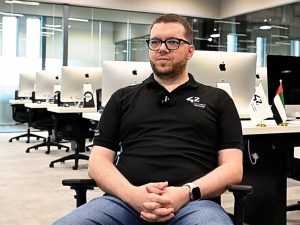ABU DHABI / WAM
42 Abu Dhabi, the UAE capital’s coding school that trains Emirati and expatriate coders to support the Emirate’s digital transformation, is serving a global purpose as well.
Offering a free-of-charge learning model, the school is also educating students from impoverished communities worldwide and empowering them, Marcos Muller Habig, the school’s Acting CEO, told the Emirates News Agency (WAM).
“One of the key points about coding is that it is not just about changing an individual’s life, but it can change an entire community,” he said in an interview with WAM at the school campus.
Students from 35 countries, including those facing economic hardships and conflicts, have relocated to Abu Dhabi for this life-changing opportunity, Habig revealed.
A few of them had sold their assets to afford the education and landed jobs in Abu Dhabi, which in turn, helps reinvest in their communities, he explained.
Work from anywhere
The school head emphasised the importance of coding as a location-independent skill that opens doors to remote work and better earning potential.
“Our mission is to create a community of coders who can work from anywhere, enabling them to support their families and make a difference in their communities.”
The innovative coding school, part of the 42 networks, offers a peer-to-peer, gamified learning methodology. It allows students without previous coding experience or academic qualifications to access high-quality coding education and secure remote employment opportunities, thereby improving their families’ and communities’ living standards. The school has been supported by the Abu Dhabi Department of Education and Knowledge (ADEK) since its launch in 2020.
AI not a threat
Habig stressed that despite advancements in Artificial Intelligence (AI), the demand for skilled coders remains high.
“AI might change the game, but it won’t replace good coders,” he stressed. “In fact, it will create more opportunities for them.”
As the demand for skilled coders continues to rise, the top executive remains optimistic about the future of the profession.
“The need for good coders is always going to be there,” he asserted, “because AI is created by coders.”
Arduous admission process
The admission process ensures only the most committed and persevering individuals gain entry, the school head said. Around 761 current students were selected from thousands of applicants.
“It is not about skill or intelligence,” Habig explained. “It is about commitment and perseverance in the face of adversity and failures.”
The student body consists of 54 percent individuals who have never coded before and 74 percent who are switching careers, he noted.
96% internship placements
Students who complete the school’s Common Core, four additional modules and six-month internship are eligible to receive a Diploma in software development recognised by the National Qualification Centre (NQC).
The school expects 140 graduates by year-end, with placements in various companies underway. “Some of them are going out and finding their jobs,” Habig said.
Partnerships with industry leaders and government entities, such as Mubadala Investment Co, Abu Dhabi Department of Energy (DoE), Department of Government Enablement, Microsoft and BEACON RED, ensure that 42 Abu Dhabi curriculum remains aligned with real-world demands, he explained.
The top executive emphasised the importance of these collaborations. “Nothing is more important for us than our students having the skills to contribute to industry from day one. About 96 percent of students who completed the common core have secured internship opportunities with industry leaders.”
Student-projects to startups
Recognising the entrepreneurial potential of its students, 42 Abu Dhabi is nurturing a pipeline of six student-led projects with startup ambitions, the head of the school revealed.
These homegrown ideas, born from hackathons and competitions, are being mentored and guided towards commercialisation, contributing to the UAE’s burgeoning startup ecosystem, he noted.
“We have people here that are learning coding so that they can pursue a master’s or a PhD in great places like Mohamed Bin Zayed University of Artificial Intelligence (MBZUAI) in Abu Dhabi. This is something we are looking for. We want to complement higher education.”
42 Abu Dhabi, offering four intakes this year, invites aspiring coders to earn a spot in this transformative programme, Habig said.
For the 2-hour gamified entry test, the tip is to rest well before the attempt and persist beyond the initial 30 minutes. “So, it is about that perseverance,” the top executive pointed out.
 The Gulf Time Newspaper One of the finest business newspapers in the UAE brought to you by our professional writers and editors.
The Gulf Time Newspaper One of the finest business newspapers in the UAE brought to you by our professional writers and editors.
